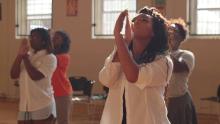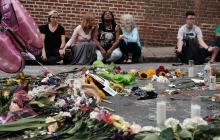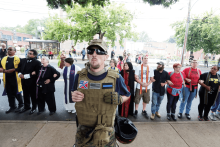Opinion

It’s a powerful setup, and the girls’ (and their team’s) journeys are inspiring. But it’s hard to shake the feeling that Lipitz is more concerned with crafting a tidy, three-act narrative than with taking an honest look at who these girls are, and the issues they face.

Of the many shocking images from Charlottesville, one continues to haunt me. White men, mostly younger, are marching and carrying torches in the night with faces full of grim hate and determined anger. It was malevolently reminiscent of the Ku Klux Klan’s torch-lit night rallies, with cross burnings and the evil actions and killings that often followed. Even more, it brought memories of the Nazis marching with their torches, slogans, and violence in the 1930s. The neo-Nazis in Charlottesville chanted some of those same slogans.

Somewhere completely outside of all of this,
you are ushering in a kingdom not of this world,
one that rights all wrongs and rules in love.
But for now, here we are.

I have been asked by two dear friends, “how can I be a stronger ally?” Being the slow emotional processor that I am, I wanted to spend some time with this before I answered them. I surely appreciate and love these two individuals, and I appreciate their vulnerability in asking me this question. I am not going to do much coddling here; I don’t know that I believe that love requires coddling. Here are six things you can do to be stronger allies.

On Friday, I traveled to Charlottesville, Va., to bear witness. What I saw there deeply unsettled me. White supremacists, gathered for a rally at a statue of Confederate General Robert E. Lee, boldly manifested the evil legacy of America’s original sin. Unfolding in streets throughout the city the heritage of whiteness was revealed in full display. Perhaps most disturbing was the unashamed nature of this hate-filled display: In 2017, white supremacists wear no hoods.

And our best chance at fighting supremacy on a daily basis is to know who we are, to know the truth of what we are called to be in the name of Jesus — based on his peace, his shalom, his justice, and based on the fact that all people are equally valuable in their own skin and own cultures. This forces us to take a look at our missionary ideologies, at the way we view light and darkness and what we teach from our pulpits and in our bible studies. It forces us to recognize that people who are outside the institutional church are doing the good work of Jesus, too, and we learn from them.

The crowd that night believed something precious had been “stolen” from them as Christians. And it had to be “reclaimed.”
That long ago bitter sermon provides a warning as Americans ponder this question: Was the lethal violence in Charlottesville a one-time event, or does it represent the future of an America religiously and politically at war with itself?

Can you imagine one of the white supremacists in Charlottesville, Va., making this same argument for the swastika, somehow trying to suggest that it isn't a display of hate but of the heritage of the ancient Hindu principle of "making of goodness"?

Buried beneath daily headlines dominated over the past year by the Russia investigation, Brexit, and the impasse over health care lies an escalating humanitarian crisis that should be breaking our hearts and assaulting our consciences: More than 20 million people’s lives hang in the balance due to a mounting famine in Yemen, South Sudan, northern Nigeria, and Somalia.

Aug. 9 is a good day to remember that the United States stands alone in the fire and fury we have brought to the world. There is only one nation that has used a nuclear bomb on people — the United States, and we did it twice in one week. The United States dropped the "Little Boy" bomb on Hiroshima on Aug. 6, 1945; three days later we dropped the "Fat Man" bomb on Nagasaki. More than 100,000 died instantly that week, and tens of thousands more in the weeks to follow.

So much in the world needs to change, but the people doing the most to change the world are often zealous. I know I was — and self-righteous, too. Yet perpetual effort to forge a new world did not heal my soul; rather, it deepened my soul’s sense of separation from love. To put it theologically, a friend involved with left-wing Catholic Worker style communities describes a subtle culture of “not enough,” as communal embodiment of what Martin Luther called “works-righteousness.”

The point is not that North Korea should be given free-reign by the international community to develop any and all weapons that it so chooses. But Gollwitzer would have American Christians remember that they are called to be a political influence in the service of peace. For Gollwitzer, you can tell whether Christians have understood the gospel by whether they reject war under nuclear conditions: “the ‘Yes’ to the Gospel and the ‘No’ to war today must go together — or both will be lost” (Demands of Freedom, p. 136.).

My son wanted a simple answer, and I could not give him one. It is similar to our overall climate today — we want simple answers to our questions, but that’s not always possible, is it? Humanity is not always simple. But it is necessary that we see the reality we face for and with our children. The things we teach them today, the way we talk about the world, the church, the political climate — it affects them and shapes their futures.

The newly released movie Detroit inflames past wounds of race, poor economic conditions, and police brutality in a city still gripped with these issues. I won’t give spoilers to the movie but I will share how Congresswoman Maxine Waters’ recent trending statement ‘reclaiming my time’ provides wisdom for a divided community to heal and waste no time re-living the past.

Everyone deserves our love, especially those whom the “religious” people deem unworthy — tax collectors, Samaritans, lepers, the homeless, the beggars, the sick, the mentally ill, the despairing.

News that scientists for the first time successfully edited genes in human embryos created a stir this week. In the experiment, outlined in a paper in the journal Nature published Wednesday, scientists essentially snipped a mutant gene known to cause a heart condition that can lead to sudden death.

For years, the American evangelical church and many of its denominations have used the Bible as a way to control, oppress, and abuse others — from cultural genocide to the abstinence/purity movement. In my church, which was part of the Southern Baptist Church, I grew up learning that to love God meant to get my checklist in order and to use that checklist to secure the salvation of everyone I came in contact with.

Americans think of the U.S. as being a classless society. Piketty points out that our country invented progressive taxation of income and of large estates, to avoid the inequalities rife in a patrimonial society like “Old Europe.”

A neo-Nazi had walked into a gurdwara — or Sikh temple — in Oak Creek, Wis., and gone on a rampage, fatally shooting six worshippers and wounding several others, including a police officer. To this day, the attack on the Oak Creek gurdwara remains one of the deadliest acts of violence on an American house of worship in our nation’s history.

Sixteen years ago as a college student at Wake Forest University, Justin Lee created a website for LGBT Christians with the goal of creating a small online community. Now, the Gay Christian Network is a cornerstone organization in the LGBT Christian community. Its annual conference is credited as the largest gathering of LGBT Christians, many of whom have found a home within the community the organization has fostered. On July 20, the organization and Lee parted ways, saying in a joint statement that they “have come to realize they have differing perspectives on the operational needs of the ministry."